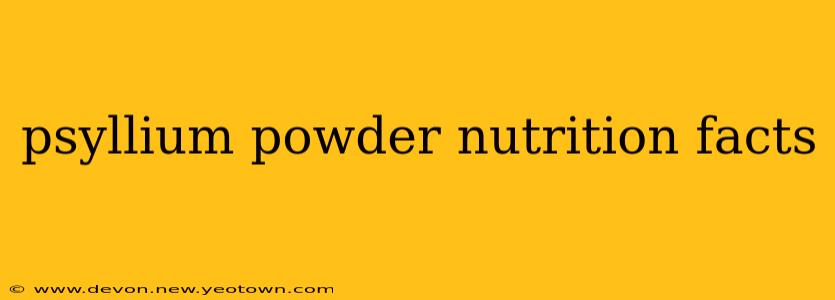Psyllium husk powder, a fiber supplement derived from the seeds of the Plantago ovata plant, has quietly become a staple in many health-conscious individuals' diets. But what exactly makes this seemingly simple powder so beneficial? Let's delve into the nutritional facts and explore the reasons behind its rising popularity.
Psyllium Husk Powder: Nutritional Breakdown
Before we jump into the specifics, it's crucial to understand that the nutritional content of psyllium husk powder can vary slightly depending on the brand and processing methods. However, a general overview reveals a powerhouse of fiber, with minimal other nutrients. A typical serving (around 1 tablespoon or 7 grams) generally contains:
- Fiber: This is the star of the show. Psyllium husk is exceptionally high in fiber, primarily soluble fiber. This type of fiber absorbs water and forms a gel-like substance in the digestive tract, contributing to several health benefits. You'll find roughly 5-7 grams of fiber in a single serving. (Specific amounts will vary per brand – always check the label).
- Calories: Very low in calories, typically under 20 per serving.
- Protein: Negligible amounts.
- Fat: Negligible amounts.
- Vitamins and Minerals: While psyllium husk isn't a significant source of vitamins and minerals, it can contribute small amounts depending on processing and potential additions.
It's important to note that psyllium husk powder itself doesn't contain a significant amount of vitamins or minerals. Its primary nutritional value lies in its exceptionally high fiber content.
What are the Benefits of Psyllium Husk Powder?
The high fiber content is the key to psyllium husk's many potential health benefits:
1. How does psyllium husk help with weight loss?
Psyllium husk's high fiber content promotes satiety, meaning it helps you feel fuller for longer. This can lead to reduced calorie intake and potentially contribute to weight management. The fiber also aids in slowing down the absorption of nutrients, preventing blood sugar spikes and helping manage appetite. However, it's crucial to remember that psyllium husk is not a magic weight-loss solution. It's most effective when combined with a balanced diet and regular exercise.
2. Is psyllium husk good for digestion?
Absolutely! The soluble fiber in psyllium husk absorbs water, adding bulk to the stool and making it easier to pass. This can help relieve constipation and promote regular bowel movements. The fiber also feeds beneficial gut bacteria, contributing to a healthy gut microbiome. However, it’s essential to increase your water intake when you add psyllium husk to your diet to prevent the opposite effect.
3. How can psyllium husk help lower cholesterol?
Studies suggest that psyllium husk may help lower both LDL ("bad") cholesterol and total cholesterol levels. The soluble fiber binds to cholesterol in the digestive tract, preventing its absorption and promoting its excretion from the body.
4. Does psyllium husk help with blood sugar control?
The high fiber content in psyllium husk helps slow down the absorption of glucose (sugar) into the bloodstream, preventing sudden spikes in blood sugar levels. This can be particularly beneficial for individuals with type 2 diabetes or those at risk of developing the condition. However, it’s always important to consult with your doctor before making significant dietary changes, especially if you have diabetes.
5. What are the potential side effects of psyllium husk?
While generally safe, psyllium husk can cause side effects if not used correctly. The most common are gas, bloating, and stomach cramps, particularly when initially incorporating it into your diet. It's crucial to start with a small amount and gradually increase your intake to allow your body to adjust. Also, always drink plenty of water when taking psyllium husk. Inadequate water intake can lead to the formation of hard, dry stools, potentially causing constipation instead of relieving it. Finally, if you have any underlying health conditions or are taking medications, consult your doctor before adding psyllium husk to your diet.
Conclusion
Psyllium husk powder, with its impressive fiber content and associated health benefits, offers a simple yet effective way to improve your digestive health, support weight management, and potentially contribute to better cholesterol and blood sugar control. However, remember that it’s a supplement, not a cure-all, and should be used responsibly. Always consult with your healthcare provider before making any significant dietary changes, especially if you have pre-existing health conditions.

